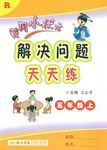题目内容
-----Must I go there right now???
? -----No, you _____. You ____go there before supper.
A? mustn’t , need???? B. needn’t, may??? C. can’t ,need???? D. won’t, can
【答案】
B
【解析】
试题分析:句意:上文,我必须马上去那里吗?下文,不,没有必要。在晚饭之前你能去那里就行。needn’t表示没有必要;may表示可以,选B。
考点:考查情态动词

练习册系列答案
 黄冈小状元解决问题天天练系列答案
黄冈小状元解决问题天天练系列答案 三点一测快乐周计划系列答案
三点一测快乐周计划系列答案
相关题目